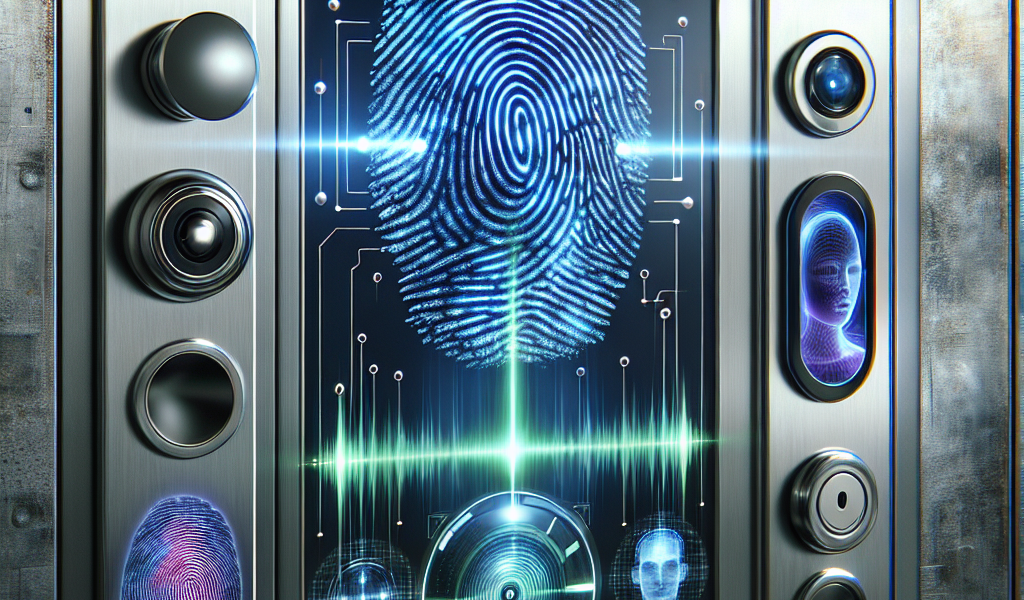-
Table of Contents
“Unlock Tomorrow: Redefining Security with Biometric Precision”
Introduction

The Future of Biometric Security Systems
As technology continues to evolve at an unprecedented pace, the future of biometric security systems promises to revolutionize the way we protect and access sensitive information. Biometric security, which utilizes unique physiological and behavioral characteristics such as fingerprints, facial recognition, iris scans, and voice patterns, is poised to become the cornerstone of next-generation security protocols. This shift is driven by the need for more robust, user-friendly, and foolproof methods of authentication in an increasingly digital world. With advancements in artificial intelligence, machine learning, and sensor technology, biometric systems are becoming more accurate, reliable, and accessible. These innovations are not only enhancing security but also streamlining user experiences across various sectors, including finance, healthcare, and government. As we look to the future, the integration of biometric security systems will play a critical role in safeguarding our digital identities and ensuring the integrity of our interconnected world.
Advancements In Biometric Authentication Technologies
In an era where digital security is paramount, the evolution of biometric authentication technologies offers a promising glimpse into the future of safeguarding personal and sensitive information. As cyber threats become increasingly sophisticated, traditional methods of security, such as passwords and PINs, are proving inadequate. This inadequacy has paved the way for biometric security systems, which leverage unique biological traits to verify identities with a higher degree of accuracy and reliability.
One of the most significant advancements in biometric authentication is the development of fingerprint recognition technology. While fingerprint scanning has been around for some time, recent innovations have enhanced its precision and speed. Modern sensors can now capture high-resolution images of fingerprints, even in challenging conditions such as wet or dirty fingers. This improvement not only boosts security but also enhances user convenience, making fingerprint recognition a preferred choice for many applications, from unlocking smartphones to accessing secure facilities.
In addition to fingerprint recognition, facial recognition technology has made remarkable strides. Powered by artificial intelligence and machine learning algorithms, contemporary facial recognition systems can analyze and identify faces with exceptional accuracy, even in crowded or poorly lit environments. This technology is increasingly being integrated into various sectors, including law enforcement, banking, and travel, to streamline processes and enhance security measures. However, it is essential to address the ethical concerns surrounding privacy and surveillance to ensure that the deployment of facial recognition technology respects individual rights and freedoms.
Another noteworthy advancement is the use of iris recognition, which involves scanning the unique patterns in the colored part of the eye. Iris recognition is highly secure due to the complexity and stability of iris patterns, which remain unchanged throughout a person’s life. This technology is particularly valuable in high-security environments, such as government agencies and military installations, where robust authentication is crucial. Moreover, the non-intrusive nature of iris scanning makes it a user-friendly option, further contributing to its growing adoption.
Voice recognition technology is also gaining traction as a viable biometric authentication method. By analyzing vocal characteristics such as pitch, tone, and cadence, voice recognition systems can accurately verify an individual’s identity. This technology is especially useful in scenarios where hands-free authentication is necessary, such as in automotive systems and smart home devices. However, challenges such as background noise and voice modulation need to be addressed to enhance the reliability of voice recognition systems.
As biometric authentication technologies continue to advance, the integration of multiple biometric modalities is emerging as a powerful approach to enhance security. Multi-modal biometric systems combine two or more biometric traits, such as fingerprints and facial recognition, to create a more robust and foolproof authentication process. This approach not only mitigates the risk of spoofing but also provides a higher level of accuracy, making it an attractive option for critical applications.
Despite the promising advancements, it is crucial to acknowledge the potential risks and challenges associated with biometric security systems. Issues such as data breaches, identity theft, and the misuse of biometric data pose significant threats. Therefore, it is imperative to implement stringent data protection measures and establish clear regulatory frameworks to safeguard biometric information.
In conclusion, the future of biometric security systems holds immense potential to revolutionize the way we protect our digital and physical assets. As technology continues to evolve, it is essential to strike a balance between innovation and ethical considerations to ensure that biometric authentication technologies are deployed responsibly and effectively. By doing so, we can create a more secure and trustworthy digital landscape for everyone.
The Role Of AI In Enhancing Biometric Security
In an era where digital security is paramount, the integration of artificial intelligence (AI) into biometric security systems is revolutionizing the way we protect our personal and sensitive information. As cyber threats become increasingly sophisticated, the need for more advanced security measures has never been more critical. AI, with its ability to learn and adapt, is playing a pivotal role in enhancing the effectiveness and reliability of biometric security systems.
Biometric security systems, which rely on unique physical characteristics such as fingerprints, facial recognition, and iris scans, have long been considered a robust method of authentication. However, traditional biometric systems are not without their vulnerabilities. Hackers have found ways to spoof biometric data, and the static nature of these systems means they can sometimes fail to recognize legitimate users due to changes in appearance or environmental conditions. This is where AI steps in, offering a dynamic and adaptive approach to biometric security.
One of the most significant advantages of AI in biometric security is its ability to continuously learn and improve. Machine learning algorithms can analyze vast amounts of data to identify patterns and anomalies that may indicate fraudulent activity. For instance, AI can detect subtle changes in a person’s gait or voice that might be missed by traditional systems. This continuous learning process ensures that the system becomes more accurate and reliable over time, reducing the likelihood of false positives and negatives.
Moreover, AI enhances the speed and efficiency of biometric authentication. Traditional systems can be slow and cumbersome, often requiring multiple attempts to verify a user’s identity. AI-powered systems, on the other hand, can process and analyze data in real-time, providing instant authentication. This not only improves the user experience but also reduces the risk of security breaches by minimizing the window of opportunity for attackers.
Another critical aspect of AI in biometric security is its ability to adapt to changing conditions. For example, facial recognition systems can struggle with variations in lighting, angles, and expressions. AI algorithms can be trained to recognize and account for these variations, ensuring consistent and accurate identification. This adaptability is particularly important in real-world scenarios where conditions are rarely perfect.
Furthermore, AI can enhance the security of biometric data itself. Biometric information is highly sensitive, and its compromise can have severe consequences. AI can be used to encrypt and protect this data, making it more difficult for hackers to access and exploit. Additionally, AI can monitor for signs of tampering or unauthorized access, providing an extra layer of security.
Despite the many benefits, the integration of AI into biometric security systems is not without its challenges. There are concerns about privacy and the potential for misuse of biometric data. It is essential to establish robust ethical guidelines and regulatory frameworks to ensure that AI is used responsibly and that individuals’ rights are protected. Transparency and accountability are crucial in building public trust in these advanced security systems.
In conclusion, the role of AI in enhancing biometric security systems is transformative. By leveraging the power of machine learning and real-time data analysis, AI can address many of the limitations of traditional biometric systems, providing a more secure and efficient method of authentication. As we continue to navigate the complexities of the digital age, the integration of AI into biometric security will be a critical component in safeguarding our personal and sensitive information. The future of biometric security is undoubtedly intertwined with the advancements in AI, promising a safer and more secure digital landscape.
Privacy Concerns And Ethical Implications Of Biometric Systems
As biometric security systems become increasingly prevalent in our daily lives, from unlocking smartphones to accessing secure facilities, the conversation around privacy concerns and ethical implications has gained significant traction. While these systems offer unparalleled convenience and enhanced security, they also raise critical questions about the balance between technological advancement and individual privacy rights.
One of the primary concerns surrounding biometric systems is the potential for data breaches. Unlike passwords or PINs, biometric data such as fingerprints, facial recognition, and iris scans are immutable. Once compromised, they cannot be changed. This permanence makes biometric data a particularly attractive target for cybercriminals. The consequences of such breaches could be far-reaching, affecting not only personal privacy but also national security. For instance, if a database containing biometric information of government employees were hacked, it could lead to severe security vulnerabilities.
Moreover, the collection and storage of biometric data often occur without explicit consent or adequate transparency. Many users are unaware of how their data is being used, who has access to it, and how long it will be stored. This lack of transparency can erode trust and lead to a sense of helplessness among individuals who feel they have no control over their personal information. In some cases, biometric data is collected under the guise of convenience, but the potential for misuse remains a significant concern.
In addition to privacy issues, the ethical implications of biometric systems cannot be ignored. One major ethical dilemma is the potential for discrimination and bias. Studies have shown that facial recognition technology, for example, can be less accurate in identifying individuals with darker skin tones, women, and older adults. This bias can lead to wrongful accusations, unequal treatment, and a perpetuation of existing societal inequalities. As these systems are increasingly used in law enforcement and public surveillance, the risk of biased outcomes becomes even more pronounced.
Furthermore, the use of biometric systems in surveillance raises questions about the right to privacy in public spaces. The deployment of facial recognition technology in public areas, such as airports, shopping malls, and city streets, can create a sense of constant surveillance. This omnipresent monitoring can have a chilling effect on free expression and assembly, as individuals may alter their behavior due to the fear of being watched. The ethical implications of such surveillance are profound, as they touch upon fundamental human rights and freedoms.
Despite these concerns, it is essential to recognize the potential benefits of biometric security systems. They offer a level of security that traditional methods cannot match, reducing the risk of identity theft and unauthorized access. However, to fully realize these benefits, it is crucial to address the privacy and ethical issues head-on. This can be achieved through robust regulatory frameworks that ensure transparency, consent, and accountability in the collection and use of biometric data.
In conclusion, while biometric security systems hold great promise for enhancing security and convenience, they also present significant privacy concerns and ethical challenges. As society continues to grapple with these issues, it is imperative to strike a balance that protects individual rights while embracing technological innovation. By fostering an open dialogue and implementing stringent safeguards, we can navigate the complexities of biometric security systems and build a future that respects both privacy and progress.
Conclusion
The future of biometric security systems is poised for significant advancements, driven by technological innovations and increasing demand for robust security measures. As biometric technologies such as fingerprint recognition, facial recognition, and iris scanning become more sophisticated, they offer enhanced accuracy, convenience, and security. Integration with artificial intelligence and machine learning will further improve the ability to detect and prevent fraudulent activities. However, challenges related to privacy concerns, data protection, and ethical considerations must be addressed to ensure widespread adoption and trust. Overall, biometric security systems are expected to play a crucial role in the future of secure authentication and identity verification.





